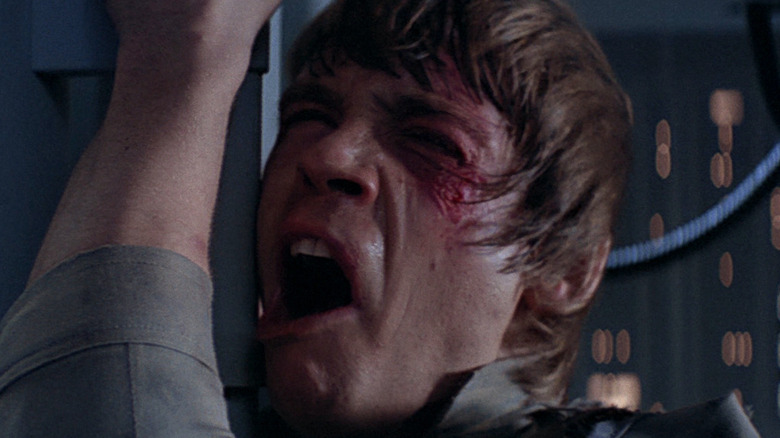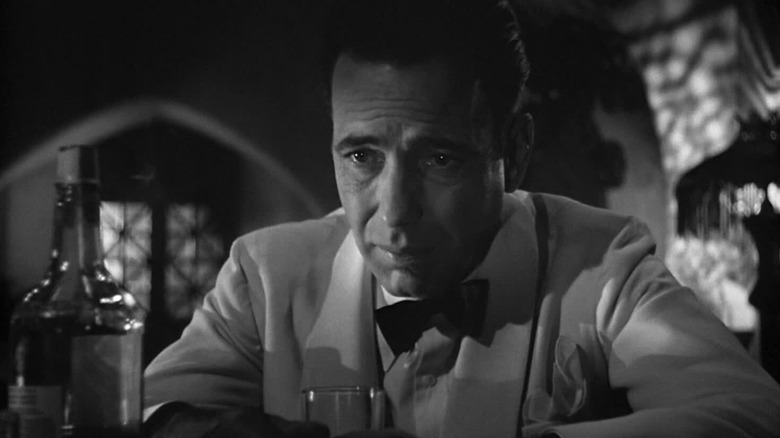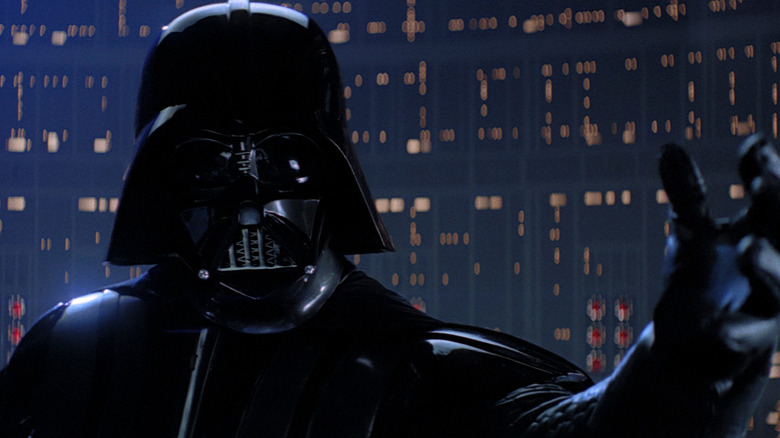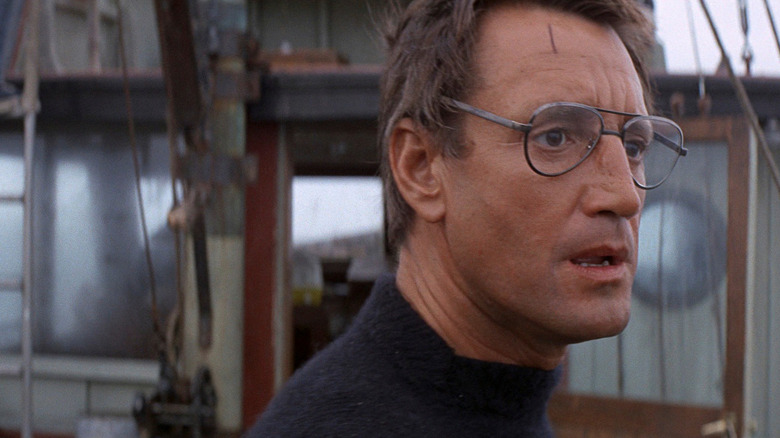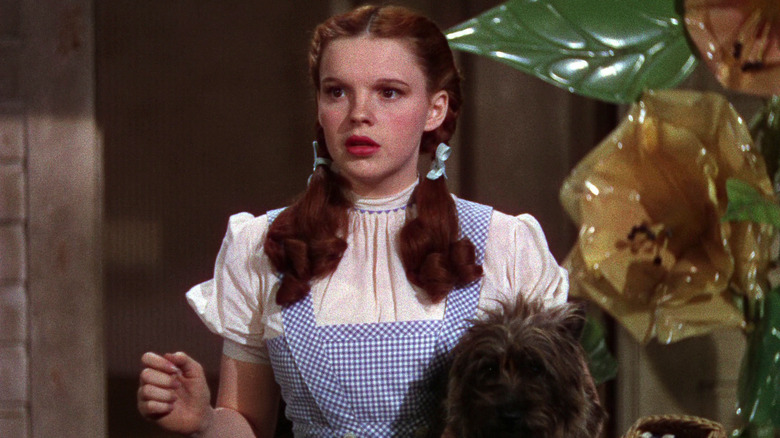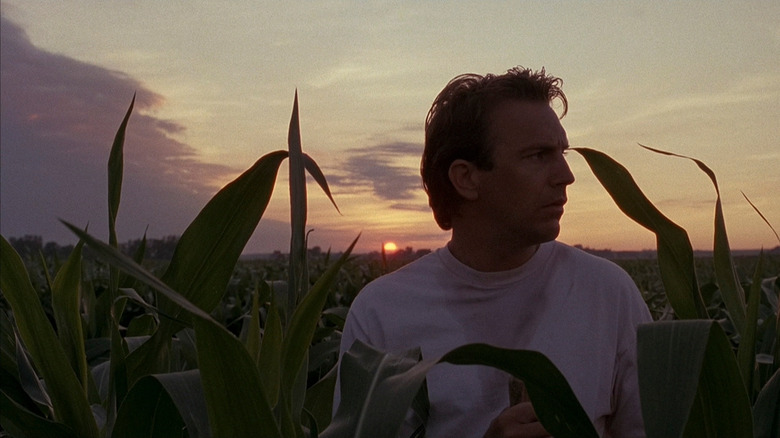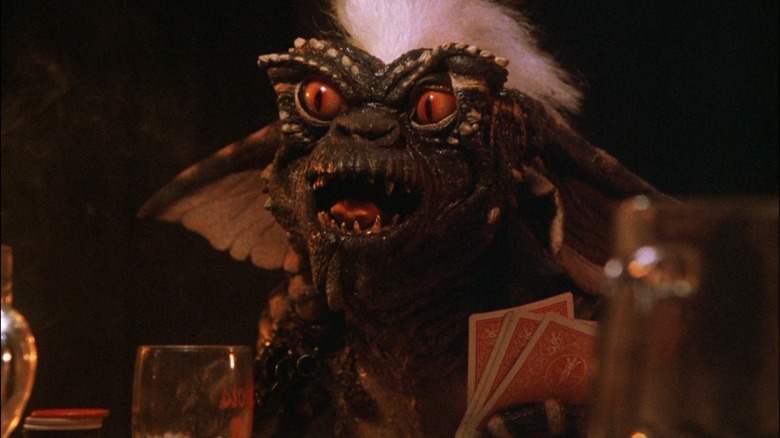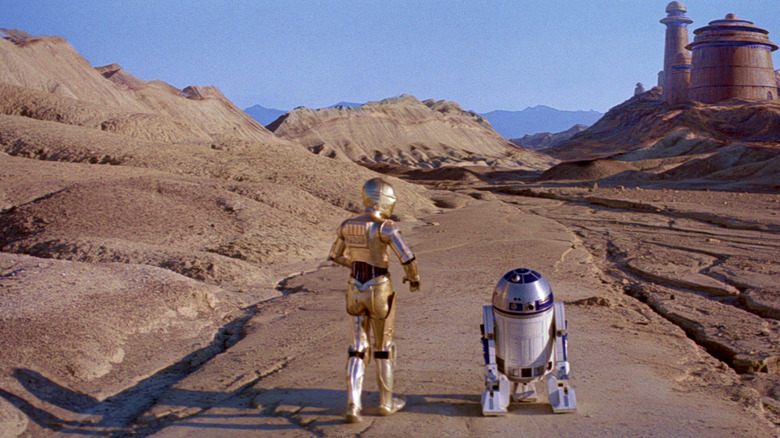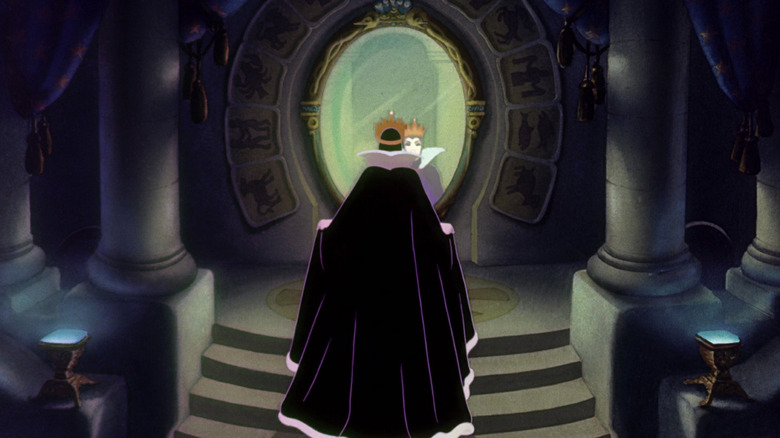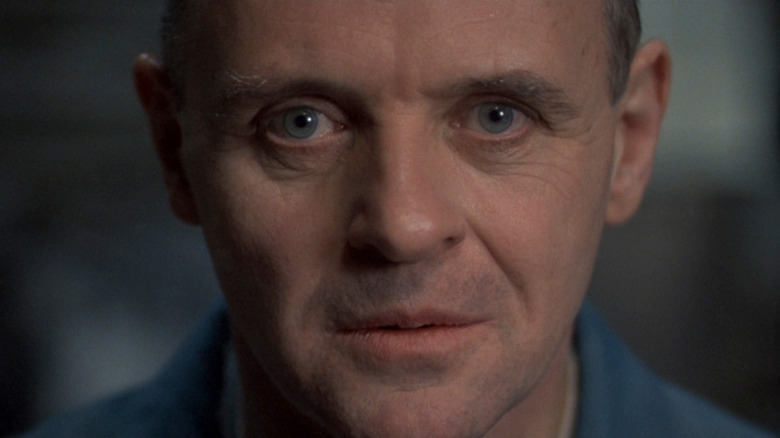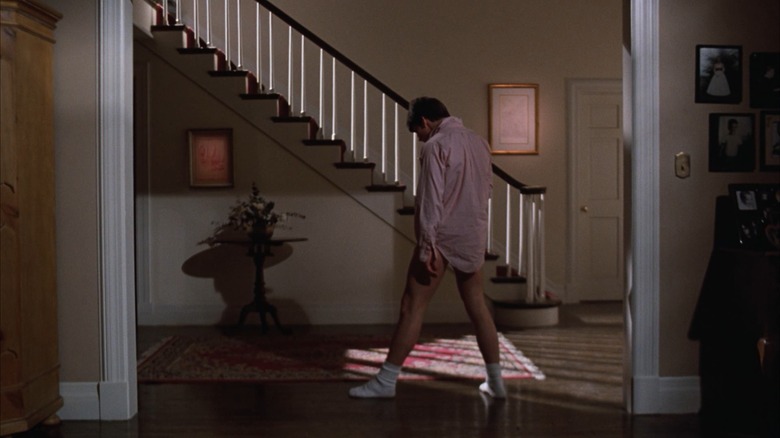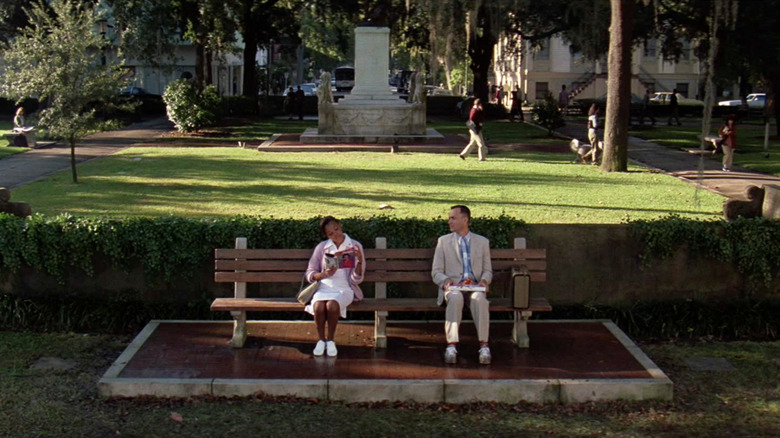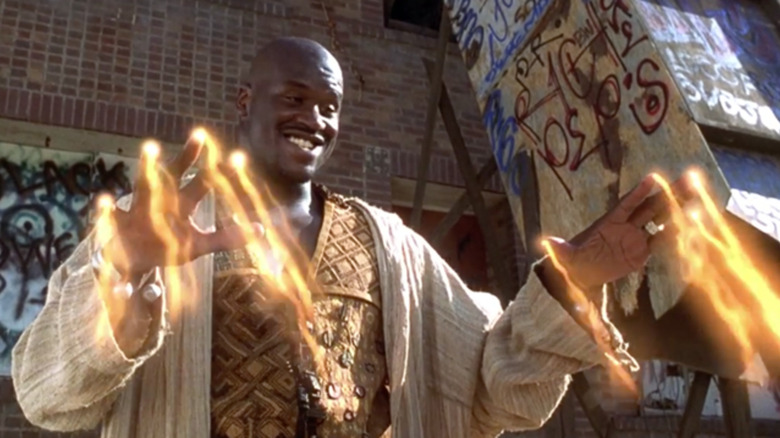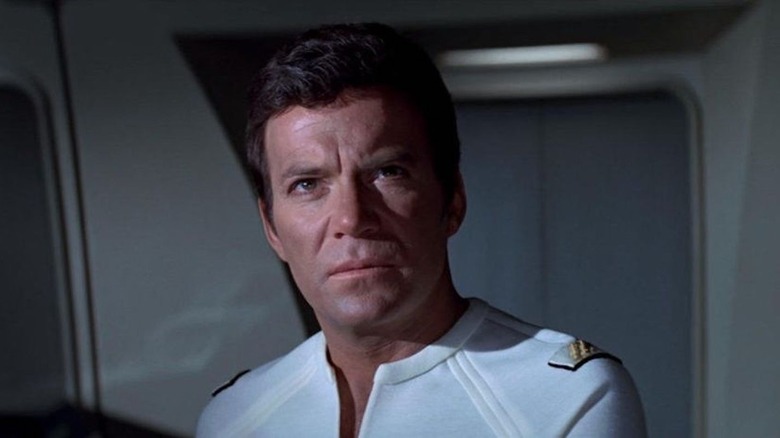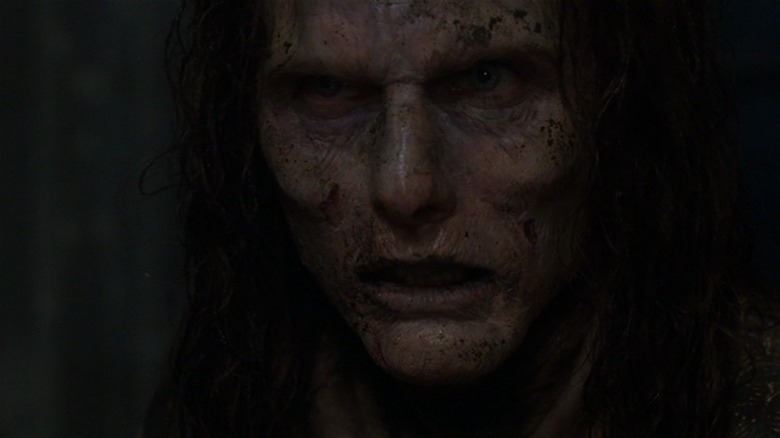Huge Movie Mandela Effects That'll Have You Questioning Everything
We may receive a commission on purchases made from links.
Human memory is a fragile thing. Science tells us repeatedly not to rely on eyewitness accounts, and time and time again, we're supplied evidence that reality and our perception of it are two very different things. Case and point: the Mandela Effect. First coined in 2010, the psychological phenomenon describes a false memory where someone remembers something that did not happen or recalls it differently than it actually took place. The phenomenon was dubbed "the Mandela Effect" by a self-anointed "paranormal consultant" named Fiona Broome to describe a false memory she claimed to share with "perhaps thousands" of other people. Namely, that South African anti-Apartheid leader Nelson Mandela had died in prison in the 1980s. (In reality, Mandela died in 2013 well after serving a term as the South African president for five years).
The Mandela Effect encompasses several relatively grounded cognitive theories (including cognitive reinforcement and misinformation) as well as some whackier fields of thought that claim that collective false memories are evidence of parallel universes. No, really. One of the less scary (if certainly frustrating) permutations of the Mandela Effect is in our amassed recollection of pop culture. Often taking the shape of misremembered quotations (but going so far as to manifest entire films), the Mandela Effect has its hooks in the average moviegoer's mind, whether they know it or not. For some unnerving examples of the fault in our recollection of iconic film moments, here's a look at some of the biggest Mandela Effects in movies that will have you rethinking your confidence in your ability to recall basic film facts.
No one says 'Play it again, Sam' in Casablanca
American expatriate Rick Blaine (Humphrey Bogart) runs a nightclub that attracts a wide swath of clientele, from corrupt police prefects to refugees to old flames. On a balmy Moroccan evening, one such flame waltzes into Rick's establishment: his former lover, Ilsa Lund, the woman responsible for his hardened, cynical disposition. Immediately gravitating toward Sam, the bar's pianist, Ilsa asks about their mutual friend. Picking up on Ilsa's intentions, Sam urges her to leave Sam be. But Ilsa's relationship with the past is a romantic one, and so she makes a request: "Play it once, Sam, for old times sake." After a gentle decline, Illsa pushes again, more softly: "Play it, Sam. Play 'As Time Goes By.'" Unable to resist Ilsa's charms, Sam concedes, and as the love song fills the air, Rick storms over, incensed that the song he expressly forbid — the song inextricably linked to the life he's tried to forget — is getting airtime. Later, while attempting to drown his resurfaced feelings, Rick echoes Ilsa's request: "Play it."
So, how did that pesky little adverb "again" get lodged into one of the most famous lines in film history? It's easy to understand the error. Both Ilsa and Rick's requests carry an implied, nostalgic "again." This is their song, and Sam has played it for them before. And yet the misquote, "Play it again, Sam," persists in the popular conscience. Maybe we can blame our collective ability to read between the lines. Or, better yet, the "Casablanca"-indebted Woody Allen film "Play It Again, Sam."
Darth Vader doesn't say, 'Luke, I am your father'
You would think that folks would accurately remember one of the most famous plot twists in film history, but you would be wrong. When "Star Wars: Episode V — The Empire Strikes Back" originally premiered in 1980, the revelation of Luke Skywalker's parentage was a total bombshell. That is unless you were from the Netherlands and already started connecting the dots back in "A New Hope" (Vader means "father" in Dutch).
Let's set the scene: Luke has abandoned his training on the swamp planet Dagobah after experiencing a premonition that his pals are in danger. When he finally arrives in Cloud City, he is confronted by Darth Vader. After duking it out with their lightsabers, Vader overwhelms and (literally) disarms Luke and presents him with a proposition: embrace the dark side of the Force, destroy Vader's master, and rule the galaxy together. Defiantly, Luke refuses, reciting his old friend Obi-Wan's claim that Vader killed his father. Then, bombshell at the ready, Vader corrects him: "No, I am your father." So why do we all remember the line as beginning with "Luke" rather than "no"? Maybe it's because Vader's "join me" monologue begins with "Luke." Or maybe we all just collectively decided that the context of the protagonist's name gave things a bit more of a punch.
In Jaws, it's 'We're going to need a bigger boat'
With an unnerving amount of blood in the water and increasingly unavoidable evidence that a massive great white shark is to blame, Quint, Brody, and Hooper set out to sea to hunt the man-eating menace. On a bright sunny day, Brody (Roy Scheider) hucks a chum line off the side of Quint's boat — named "Orca" — in hopes of attracting the creature. With a cigarette dangling lazily between his lips, Brody absentmindedly scoops guts and viscera overboard while bantering with the others. Then, wouldn't you know it, the massive shark makes an appearance, startling Brody (and, let's be fair, us). Backing away towards the cabin, eyes fixed unblinkingly on the crimson waters, Brody approaches Quint. After a sweaty pause, Brody cracks wise: "You're going to need a bigger boat."
While a misremembered pronoun might not sound like much of a difference, the subtleties in our collective misremembering of Brody's iconic line are interesting. As it plays out in our minds, Brody's quip implies that he and the boys are a team; the Orca is their boat. However, there are subtitles in Schieder's actual delivery that feel a lot more barbed and icy: For all his prowess and purported skill, Quint's boat isn't going to cut it against this bonafide monster. Maybe it's this extra layer of sass that makes "You're going to need a bigger boat" less repeatable than "We're."
'I don't think we're in Kansas anymore' is a misquote
It's no mistake that the vast majority of movie Mandela Effects are tied to über famous movie lines. After all, in order to get scrambled in the popular conscience's game of telephone, a line has to be famous enough to be repeated. And lines don't come much more famous than Dorothy's exclamation in "The Wizard of Oz." After transitioning from the folksy sepia dustbowl to an opulent technicolor daydream, our heroic country bumpkin takes note of the cinematic spectacle, addressing her faithful dog (and, silently, us, the bedazzled audience).
So why, exactly, do our brains tell us that the line is "I don't think" versus "I've a feeling we're not"? One reason may be that Dorothy's actual line is a lot more colloquial and old-timey sounding, especially with the more causal clause of "I've a feeling." Meanwhile, "I don't think we're in Kansas anymore" is shorter, punchier, and close enough to the original to pave the way for a mix-up.
The voice in Field of Dreams
Most misremembered movie lines don't change much about the core narrative of their film. Sure, the wrong pronoun or adverb may imply subtle differences, but generally speaking, the core thought of the line is kept intact. Not so with the Mandela Effect plaguing "Field of Dreams," the Academy Award-nominated, Kevin Costner-starring 1989 American sports fantasy drama film.
Even if you haven't seen Phil Alden Robinson's film (which you should, it's great), you've probably heard the line, "If you build it, they will come." Only, it's not "they," it's "he." And if you'd actually seen the film, you'd know why contextually, "they" doesn't make any sense. "Field of Dreams" follows Ray Kinsella (Costner), a middle-aged farmer in Iowa haunted (quite literally) by the ghost of his estranged, baseball-loving dad. One evening, while walking through his cornfield, Ray hears a disembodied voice whispering, "If you build it, he will come." Suddenly, he sees a vision of a baseball diamond in his cornfield with famous American outfielder "Shoeless Joe" Jackson standing at its center. Thus begins Ray's quest to build a baseball diamond in his cornfield.
Once again, we highly suspect that this misremembered quotation can be chalked up to applicability. Prophesying that "he" will come is a lot narrower than "they." The fact that the ghostly voice whispers the prophecy, making the "he" a bit hard to hear, also certainly doesn't help.
The name of the evil lead gremlin in Gremlins
Joe Dante's 1984 holiday horror-comedy "Gremlins" is full of mischievous little freaks. But of the entire cackling horde, one pint-sized maniac is more, uh, maniacal than the rest. Easily identified by his characteristic white mohawk, the leader of the Gremlins is, for whatever reason, stronger, smarter, and deadlier than his subordinate peers. But what, pray tell, is his name? Well, despite lots of moviegoers remembering this demonic little dude's name as "Spike," the main villain's name in "Gremlins" is actually "Stripe."
It's an incredibly understandable mixup. Both names begin with "S," they have the same syllables, and they both feel appropriate for the character. He even has spiked hair — a stripe of white, if you will. You can see how things might get confusing. Plus, for all of its blender-deaths and genuinely macabre humor, "Gremlins" was, and remains, a great introductory horror film for kids, and kids don't always have the best memories. Not only that, but without the ability to look things up online in the 1980s, it's easy to see how word of mouth cemented the muddling of the names in the minds of '80s kids.
C-3PO has a silver leg and no one remembers it
Quick! What color is the fussy protocol droid from "Star Wars"? Did you answer gold? Well, surprise, surprise, you're only kind of right. See, this bossy bucket of bolts is only mostly gold. Yep, C-3PO has a mismatched limb throughout the entire original "Star Wars" trilogy. A silver shin, to be exact. From literally his first appearance in "A New Hope," C-2PO is sporting a shiny, chrome appendage. Believe it or not, the silver leg sticks with the droid all the way through to "Return of the Jedi."
Don't believe us? Anthony Daniels (the actor who played Threepio) explains the leg in an interview with Wired. As the actor tells it, the silver shin was a part of the droid's design since the beginning. And, as Daniels notes, there's one key reason everyone (including the on-set photographer) don't notice the silver leg: it reflected everything around it, including the gold from the other leg and the rest of Daniels' costume. That C-3PO spends a lot of time shuffling through the sandy deserts of Tatooine makes the chrome leg very tricky to spot. For your best shot at clocking the leg, we recommend the icy Hoth backgrounds in "The Empire Strikes Back."
In Snow White, the Evil Queen doesn't say 'mirror, mirror on the wall'
In Disney's 1937 animated film "Snow White and the Seven Dwarfs," the Evil Queen is in possession of a Magic Mirror capable of answering all her questions truthfully. Unfortunately for the Queen, the truth can sometimes sting. Vain and contemptuous of her stepdaughter's beauty, the Queen seeks affirmation from her enchanted object. As the wind whips through her robe, she summons the "slave in the magic mirror," whose grim conscience materializes in the glass. With the solemnity of incantation, the Queen prefaces her question with an address. How does it go? It's "mirror, mirror on the wall," right?
Wrong! Yep, play back the footage, and you'll find that the iconic quote from the classic film goes a little something like this: "Magic mirror on the wall ... " Sure, the original Brothers Grimm story (translated into English) is truly "Mirror, mirror, on the wall," but if you were to ask someone what the Evil Queen in the Disney film says, what do you think they'd say? The understandably misremembered "mirror, mirror," no doubt.
Hannibal's greeting in Silence of the Lambs
Anthony Hopkins may only be on screen for just over 15 minutes in "The Silence of the Lambs," but the impact was such that he was able to secure both an Academy Award and a permanent role in pop culture history. Now, as the cannibalistic serial killer Hannibal Lecter, Hopkins gets plenty of quotable opportunities to chew the scenery. But one moment in particular — as I'm sure you've guessed by the title of this article — never happened.
Dr. Lecter greeting Clarice Starling (Jodie Foster) with a sneering "Hello, Clarice" feels like the kind of thing the disarmingly polite psychopath would say upon first meeting our heroine. But in reality, he says no such thing, merely greeting the FBI trainee with a totally sensible (and still totally creepy), "Good morning." Truth be told, when Lecter does say "Clarice," his hiss is evocative and memorable. So can you really blame us for wanting to insert it into their iconic first meeting?
The famous dance scene in Risky Business
High-achieving high school student Joel is finally home alone. His wealthy parents have left on a trip, and on the recommendation of his buddy, Miles, Joel fully intends to cut loose and have a little fun. After raiding the liquor cabinet and stripping down to his tighty-whities, Joel dances his little teenage heart out to a live rendition of "Old Time Rock and Roll" in naught but a button-down shirt and his briefs.
We're all familiar with the scene: Tom Cruise slides on his socks across the wooden floor; the stereo is enviably loud; he's got a candlestick in place of a microphone; and all told, Joel is giving a raucous, energetic performance for no one in particular. Oh right, and he's wearing Ray-Ban sunglasses. Except, you guessed it, he isn't. If you remember Tom Cruise dancing around in his underwear, sunglasses, and a dress shirt while home alone, your brain got almost every detail right. The mistake is, like most Mandela Effects, an understandable one. Cruise sports the famous shades in other key moments in the film and in much of the advertising material for "Risky Business." Spiritually, Joel is wearing sunglasses during that dance scene. But not really.
Forrest Gump's most famous quote
The framing device of Robert Zemeckis' 1994 dramedy sees our titular hero (Tom Hanks) recounting his truly unbelievable life's story on a bench to a series of strangers. In one of the film's most repeated lines, Forrest drums up wisdom from one of his mother's anecdotes (which conveniently echos the box of sweets presently resting on our protagonist's lap).
Only, despite being the film's most repeated line, movie-goers tend to misremember Forrest's folksy wisdom about the parallels between the randomness of life and confectionery assortments. Despite what you might remember, Forrest's wise momma said that life "was like a box of chocolates." In reality, Hanks never says "life is like a box of chocolates" in the film. Which, when you think about it, makes sense given the verb tense of Forrest's anecdote. Still, while the change in tense is insignificant on paper, hearing the phrase as it occurs in the film is still jarring if you're dead set that the quote is that life is, rather than was, like a box of chocolates.
No, that Sinbad genie movie doesn't exist
Arguably one of the most popular examples of the Mandela Effect, the existence (or lack thereof) of a genie movie called "Shazam" starring the comedian Sinbad is one of the wildest examples of the phenomenon. So, why do people seem to remember the stand-up comedian starring as a genie in a 1990s kid's movie?
As detailed in this profile by The New Statesman, several particularly stubborn corners of the internet are convinced they have memories of a cheesy nineties film called "Shazaam" despite there being no evidence that such a film was ever made. Even Sinbad himself took to Twitter to point out the ridiculousness of the collective daydream (as well as the not-so-coincidental-coincidence that all the "Shazaam truthers" happened to be young, impressionable kids when the film supposedly came out). Surely all those tiny, imaginative minds weren't actually thinking about the 1996 flop "Kazaam" starring basketball star Shaquille O'Neal as a genie?
Captain Kirk never says, 'Beam me up, Scotty'
Quick, name a popular "Star Trek" quote. No, not "live long and prosper." Ah yes, "Beam me up, Scotty," that iconic phrase Captain James T. Kirk definitely says when he wants to be teleported back to the starship Enterprise. Psyche. Yep, despite having its own Wikipedia page, it turns out that the iconic phrase is never mentioned once in either the "Star Trek" show or the films.
Contrary to popular belief, the misquotation never shows up verbatim in the franchise. There are plenty of "close calls" that almost get there ("Scotty, beam me up," "Beam us up, Scotty," and even a simple "Beam me up"). But if you're looking for a 100% match, you're going to come up empty. Heck, even the original Scotty actor James Doohan used the misquote as the title of his 1996 autobiography. All to say, don't feel glum that your memory of pop culture is full of holes. The phenomenon of "Beam me up, Scotty" is proof that Mandela Effects can totally take on a life of their own.
Interview with 'a' Vampire does not exist
Why are we sweating the difference between an indefinite and a definite article? Well, because our brains are pretty sure that the 1994 American gothic horror film starring Tom Cruise and Brad Pitt was called "Interview with a Vampire," that's why. Heck, at the 1995 Academy Awards, host David Letterman said "a Vampire" rather than "the" when referring to Neil Jordan's film. Later, Andie MacDowell made the same mistake when announcing the nominees for Best Original Score.
Maybe our collective renaming of the 1994 film has to do with there being something clunky about repeating the "th" sound from "with" to "the." Either way, it's very common to find people who remember the film's title very differently. Adding to the confusion, in some languages, including French ("entretien avec un vampire") and German ("Interview mit einem Vampir"), the title does translate as "a vampire." Is anyone else feeling lightheaded?
